- Home
- Lou Cameron
Stringer Page 4
Stringer Read online
Page 4
He said, “I thought you were sleepy.”
She replied, “I was. That’s why I had to sleep a few minutes. Making love is hard work, but I must say I enjoy it. How do you feel about going doggy style with the lights on? We can see ourselves in the mirror over there.”
He said, “I notice how you’ve adjusted it, honey. But I sure wish you’d make up your pretty little head. I confess I’ve cooled off considerable, since the last time you surprised me so.”
She glanced down between them, sighed, and said, “Oh, the poor little thing. Should Mama kiss it and make it well?”
Before he could answer, she was down on him, breaking the law in more than one state as she gave him a French lesson that cost extra in most houses of ill repute. He didn’t argue, for she did that mighty fine, too. But if her notion of spending a night with a gent called for waking up every few minutes to start all over, it was easy to see why her late husband had dropped dead on the walk outside.
CHAPTER
FOUR
*
Stringer survived, partly because he kept in shape and partly because the library opened early. Helen woke him up at dawn, by getting on top. Then she served him ham and eggs in bed and topped breakfast off by insisting he do something to her that was grounds for divorce in every state of the union and a felony under the moral statute laws of many.
After she’d climaxed again she sighed and said, “Oh, that was lovely. I can’t wait for my lunch hour, you wicked boy.”
He gulped and said he wasn’t sure he could meet her for lunch or anything more delicious. He explained he had a lot of business in town and sat up to grope for his underpants. She said, “You can’t leave at this hour, silly. What would the neighbors think? Why don’t you just go back to sleep and I’ll wake you in time to tend to plenty of business this afternoon?”
If there was one thing he needed, it was sleep, so he didn’t argue. He was catching up on it by the time she’d bathed, dressed, and was out the door.
But, as usual, Stringer slept lightly in a strange bed. So he woke up a few hours later, checked the time, and when he saw it was after eleven he rolled out of bed on the double in hopes of escaping with his life. It only took him a few minutes more to take a cold tub bath and dress. That reminded him of the fresh socks and underwear in his gladstone, so when he slipped out, blinking in the sunlight, to see no neighbors in sight, he headed for David’s to see if he’d been robbed.
He hadn’t. As he sat at the same blue table the gladstone wasn’t under it. But when Kate came out from the back she said, “You left your bag last night. I’ll fetch it for you.”
He said, “I’d rather have some coffee, black and strong enough to remove paint, if you can manage it. Is it permiso to leave my stuff here with you until I ride out?”
She said he’d find it behind the butcher block in the kitchen any time he wanted it and asked what he’d have to go with the coffee. He said he just wanted coffee and Kate went to get some for him.
She’d taken him up on his suggestion about removing paint, but it cleared the cobwebs from his sex-and sleep-drugged brain and, while it was at it, took the fuzz off his teeth.
As she poured him a second cup, Kate said, “It’s a good thing you dropped by. Saves looking for you. When my Julio got off work at dawn he stopped by the icehouse to see what all the fuss was about. He recognized that hombre who tried to kill you yesterday. That gunfighter and three others like him had supper here last Sunday, while Julio was helping serve on his day off from the mill. Shall I wake him for you?”
Stringer said, “Not if you got a look at them, too, Kate.”
She had. One of them had pinched her bottom. She described them as typical gringo cowhands, curling her lip in a way that made him feel a mite insulted. She added none of them seemed to be from any local spread. She explained, “One had a map and they were arguing about how far the Stanislaus might be.”
Stringer saw that made them strangers indeed, for any creeks in Calaveras County that didn’t drain into the Calaveras River had to drain into the Stanislaus to the south. He’d known the old branch brook across the Lazy K did by the time he was old enough to ask about such matters. The runoff from Uncle Don’s larger M Bar K ran into the Stanislaus as well, come to worry on it.
He asked Kate if she could recall anything else the strangers might have said. She shrugged and replied, “I asked my Julio to serve them after I’d been goosed. But wait, Julio was laughing about them when they left. He said they were talking about buried treasure. He said that was a new one, around here. The hills are full of crazy old prospectors, looking for color the forty-niners missed. But everyone knows it takes machinery and a lot of money to get at the low-grade that’s still left.”
He frowned and suggested, “They could have been talking about a pirate chest, which sounds sort of dumb, or…thunderation, a stagecoach strongbox, which don’t! Do you recall that robbery up near El Dorado, Kate?”
She smiled wearily and said, “I hope I don’t look that old to you. My grandfather was still a muchacho when they stopped that last stage. If those strangers are searching for the loot that was never recovered, they’re more than a little late. Gramp was one of the local boys who spent many a weekend looking for that strongbox. Whoever found it never saw fit to let the rest of the county in on his or her good fortune.”
Stringer said, “I’m not sure anyone ever found it. The robbery took place not too far from our Lazy K and I recall my dad commenting more than once that we lived in a poor neighborhood. He was one of the local boys as searched high and low for that strongbox and nobody in his generation seemed to have come into sudden wealth.”
Kate shrugged and said, “If it was still in the county it sure must have been hid good, then, for a lot of folk who didn’t need no map to find their way around them hills searched high and low for it, for many a year. They never found the bandit who rid off wounded, neither. Gramp thinks he must have made it, strongbox and all.”
Stringer said, “That wasn’t your grandfather shooting at me yesterday. The anniversary of Murrieta’s demise may have stirred up renewed interest in that old case.”
Kate laughed and said, “That’s silly. Any Californio can tell you Sulky Jack was just a name our kind made up to keep your own kind from hanging more of us than you might have.”
She started to pour him another. But a hell of a hubbub punctuated by gun shots commenced outside and Stringer was on his feet, headed for the door with his own gun out as Kate groaned, “Botheration, it sounds like they’re robbing the bank some more.”
Stringer came to about the same conclusion, out on the walk, when a trio of masked riders passed him, lickety-split, blazing away at everything in sight.
Since Stringer was one of the things in sight, he blazed back. The nearest rider threw up both hands and lofted his hat and six-gun skyward as only a spine-shot critter could. Then he vacated his saddle to land limp and lifeless as Stringer sped his mount and sidekicks on their way with the rest of the rounds in his wheel, and cursed when they vanished safely in their own dust.
He reloaded as he sauntered out into the settling dust to see just what he’d done. As he reached the spread-eagle remains other gents were tearing up the street afoot, guns drawn, and one shouted, “Don’t let him get away!”
Stringer didn’t. He hunkered and hauled the kerchief down for a view of the dead man’s ugly, unshaven face. He’d never seen this silly son of a bitch, either. But, from the walk, Kate shouted, “That’s the one! The one as got fresh with me!”
A townee slid to a stop on his heels, kicked the cadaver hard in the ribs, and snarled, “He got even fresher with Helen Marsh, our librarian, just now, the murderous bastard!”
He might have kicked some more. Stringer didn’t look back as he made for the library at a dead run, cursing a blue streak. When he got there he had to elbow his way through a crowd of upset townees. A deputy wearing a county badge wasn’t going to let him in until someone
shouted, “He’s one of the MacKails and he just nailed one of the bastards, Rafe!”
That got him inside, where he found a dozen-odd town and country lawmen around the library counter. One was holding the cashbox Helen used for dealing with overdrawn books as he opined, “Well, it don’t figure as robbery. They weren’t here long enough for rape. So what in thunder could they have been after?”
Stringer moved closer and stared down at the body sprawled behind the counter. Later, after they’d worked on her some, folk at Helen’s funeral would no doubt say she looked as if she was asleep. But right now she looked just awful. She’d been hit by at least a dozen rounds, and a head shot had crossed her eyes.
The town law he’d talked to before introduced Stringer to the county sheriff, who congratulated him on getting at least one of the bastards and added, “Where’s that infernal druggist? We got to hold a hearing afore the paperwork gets too confusing around here. We’ve had three folk shot in less than forty-eight hours and there has to be some point to all this noise!”
The combined learning was held that afternoon in a jury room of the small county courthouse. The courthouse was small because such business was usually slower in Calaveras County than folk back East, like Buffalo Bill, would have it.
The smoke-filled room would have been more than big enough for a jury alone. It was sort of sardine can for the coroner’s jury, witnesses, and those members of the courthouse gang who had nothing better to do. But everybody found a place to sit or stand around the long table in the center of the room.
Stringer recognized many a face in the crowd and even knew the names that went with some of them. He’d recently read a novel by a new writer called Sinclair Lewis allowing small-town justice left a lot to be desired. But there was something to be said for a community where everyone was known by general rep, when it came to situations like this one.
The town druggist—and hence forensic expert—banged his gavel and called the colored hand from the livery as first witness. As they all knew him, they took his word the first stranger Stringer had shot no doubt had it coming. More than one had seen him blow the second son of a bitch off his pony and the coroner offered Stringer the eternal gratitude of the community. Then he banged his gavel again and said, “So much for Mr. MacKail’s part in this matter. Unless I hear an objection, and I’d better not, this panel rules the deaths of them two unidentified sons of bitches justifiable homicide and a grand notion. Now we got to figure out the hard part. Has anyone here any suggestions as to why in hell anyone would want to shoot that poor library gal?”
One goat-faced old townee opined, “It could have been a crime of passion. You know what some said about the Widow Marsh, Doc.”
The coroner frowned and said, “The private life of the victim is not the matter afore this hearing, you old biddy hen. Aside from being irreverent, your suggestion is dumb. Thwarted swains has been knowed to murder a gal. But they hardly ever bring along a gang. She was found dead with her underdrawers on and almost ten dollars in her cash till. Neither rape nor robbery could have been their motive. Unless the posse cuts sign and we can get the bastards to tell us what they had in mind, I confess I’m pure confounded.”
Stringer said, “Try her this way. They may have wanted to shut her up.”
The coroner said, “They did that, sure as hell. But what could a library gal have knowed about such rough strange riders?”
Stringer explained, “When I was at the library yesterday there was one other gent there. He was in a position to hear me tell her some called me Stringer. A few minutes later another gent with a Colt ‘74 called me ‘Stringer.’ I’d never met him before and, had he asked, most of the folk around here have always known me as Stu MacKail.”
There was a murmur of comprehension and one older man asked, “How come they call you ‘Stringer,’ now, Stuart MacKail?”
The coroner banged his gavel and said, “Man has a right to get called anything he wants, Ben. What did the other one in the poor gal’s library look like, Stringer?”
MacKail sighed and said, “I was paying as much attention to him as I generally pay the fuzz balls under a bed. He wasn’t one of the three who rode out, though. He was older, dressed more townee, and, from the way Helen acted, I got the impression she knew him as a regular reader.”
The coroner said, “I know some will go to a lot of trouble to avoid library fines. But can’t you come up with a better suspect than that, old son?”
Stringer said, “I never said he had a library card. I’ve reasons for suspecting he might not have. He might not have been a county resident. Just an old gent who’d been hanging about the reading room long enough for him to assume Helen Marsh would be able to identify him if anyone as smart as us commenced asking questions.”
“What sort of questions?” asked the coroner with a frown.
Stringer said, “Like who he was, of course. I wasn’t supposed to win when he sent the Colt ‘74 after me. I know it sounds wild, but I think he did that because he heard us talking and knew I’d taken out a book he was there to steal. He’d already stolen two. I don’t know whether this was because he didn’t have a library card or whether he didn’t want to leave a record of his interest in Joaquin Murrieta. It works either way.”
The coroner blinked and demanded, “How in thunder did long-dead outlaws get into this, dammit? I know Murrieta was accused of a lot of crimes in his day, but the murder of Helen Marsh is just silly!”
Stringer took a deep breath and explained what he was doing up in Calaveras County. As the laughter subsided he said, “My paper and me agree it’s just an old forty-niner yarn. I doubt the loot from that old stage robbery is anywhere in the county as well. But men who steal library books and murder librarians may not share our common sense.”
A panel member asked, “Did that book you took out, lawful, say where one ought to start looking for that strongbox, son?”
Stringer said, “It didn’t even mention the El Dorado job. I gave it back to her last night when we sort of met up. By the way, I think she might have taken it to work with her this morning. At any rate, according to the writer, Sulky Jack was chased to Tule Lake from El Dorado County, not here.”
Another panel member opined, “That makes Murrieta’s last ride even farther. That Mex must have had wings on his pony.”
The coroner shushed him and said, “This panel wasn’t called to decide the cause of Joaquin Murrieta’s death, thank God. Is it your opinion, Stringer MacKail, that Helen Marsh might have been killed by infernal treasure hunters?”
“Yes and no. They weren’t after the treasure. They were out to keep her from telling us who that old gent hanging about her reading room might have been.”
“Would you recognize him if you saw him again?”
“I’m not sure. Like I said, an old gray fuzz ball. If he’s got enough imagination to change his hat and duds I’d never be able to swear in court it was him I saw.”
A sheriff’s deputy came in, hot and sweaty. He announced, “Well, we run ‘em out of the county, at least. Lost their trail where they forded the damned old Calaveras. We phoned ahead to Amador County, but I dunno. Time their posse can form up and get set to head ‘em off, they could be most anyplace, with sundown coming.”
Stringer asked, “What’s to keep them from doubling back?”
The deputy replied, “Nothing. But what do you expect us to do, now that they’re across the county line? Homestead there until they return, if ever?”
The coroner banged his gavel and said, “This panel finds that the death of Helen Marsh was premeditated murder on the part of persons unknown and directs the district attorney to so charge the sons of bitches when and if they get caught. Do I hear any sensible objections?”
Stringer said, “I think you gents just hit the nail on the head but I do have a question.”
The coroner shot him a reproachful look but told him to go on and ask it. So Stringer said, “If we could get a handle on just where in th
e county those rascals think the loot from that old robbery might be, it would narrow down the search for them.”
“Hell, old son, there ain’t no loot left at this late date!”
“I know that. You know that. But they don’t seem to know that. They stole the only library books that might hint at just where to start looking. But wouldn’t the county records have a full account of that old robbery?”
The deputy said, “Let’s find out. The county clerk’s office is in this very building!”
Stringer and half the others followed as the coroner banged his gavel and announced the hearing was over. The deputy clumped down the corridor and opened the door of what might have been a broom closet. The tiny office inside was cluttered with dusty old filing cabinets and a drab old gal, dusty and gray enough to have danced with Joaquin Murrieta in her day. She said the county clerk had left early to hunt some sundown venison. When the deputy said it wasn’t deer season she smiled thinly and said, “That may be why he took the game warden with him. Assuming none of you boys desire a game, liquor, or wedding license, I can likely help you just as well.”
The deputy asked if she had the county crime figures for 1853. She asked, “Wouldn’t that be in the sheriff’s files?” But when he insisted county records belonged with the infernal county clerk she gave it a go.
She didn’t find anything on the El Dorado stage robbery of ‘53 but muttered, “That’s odd. We seem to have a report for ‘51 and three for ‘52. But there’s nothing at all in this folder for ‘53 and, of course, there wasn’t another stage robbery until ‘62, so—”
The deputy insisted, “There has to be, ma’am. Everyone knows Murrieta stopped the El Dorado stage in ‘53.”
She nodded and said, “My sister was keeping company with the driver they killed. It upset us all considerable. But just the same, there’s no record of that robbery in our files.”

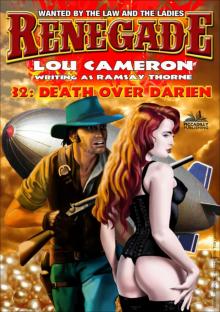 Renegade 32
Renegade 32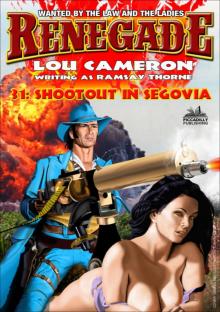 Renegade 31
Renegade 31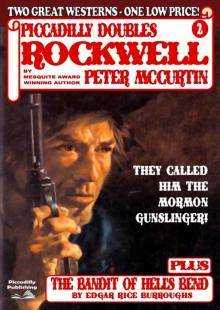 Piccadilly Doubles 2
Piccadilly Doubles 2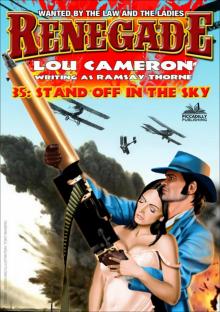 Renegade 35
Renegade 35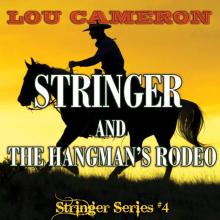 Stringer and the Hangman's Rodeo
Stringer and the Hangman's Rodeo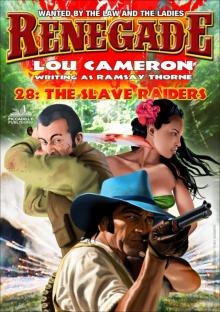 Renegade 28
Renegade 28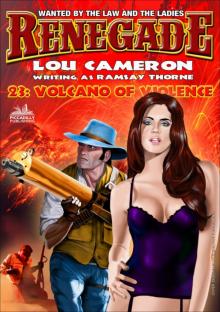 Renegade 23
Renegade 23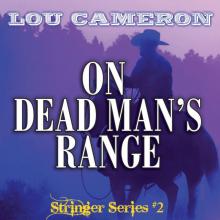 On Dead Man's Range
On Dead Man's Range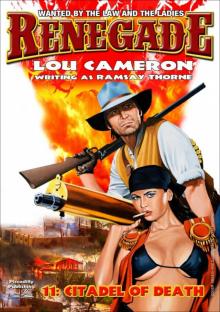 Citadel of Death (A Captain Gringo Western Book 11)
Citadel of Death (A Captain Gringo Western Book 11)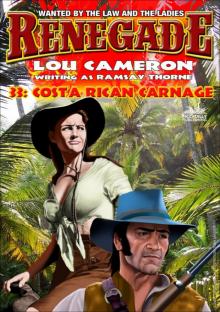 Renegade 33
Renegade 33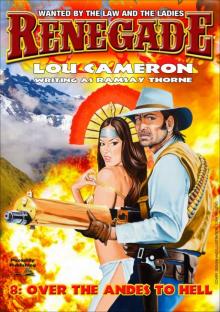 Over the Andes to Hell (A Captain Gringo Western Book 8)
Over the Andes to Hell (A Captain Gringo Western Book 8)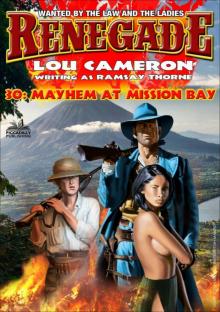 Renegade 30
Renegade 30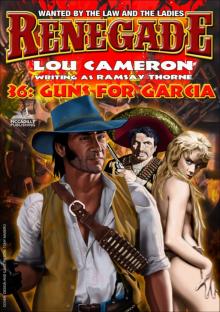 Renegade 36
Renegade 36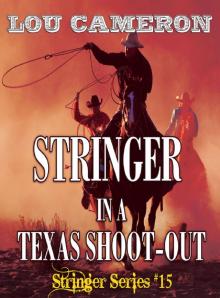 Stringer in a Texas Shoot-Out
Stringer in a Texas Shoot-Out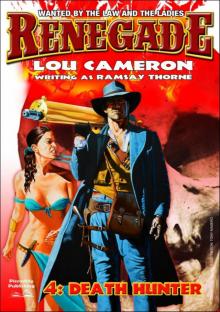 The Death Hunter
The Death Hunter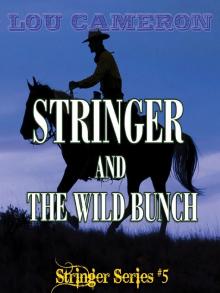 Stringer and the Wild Bunch
Stringer and the Wild Bunch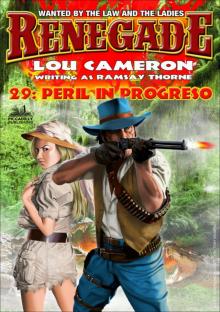 Renegade 29
Renegade 29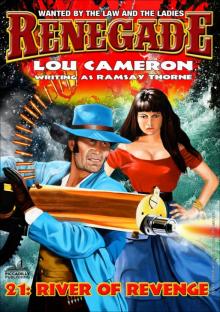 Renegade 21
Renegade 21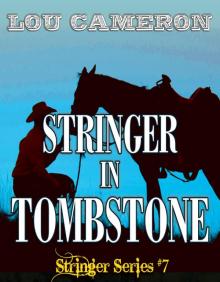 Stringer in Tombstone
Stringer in Tombstone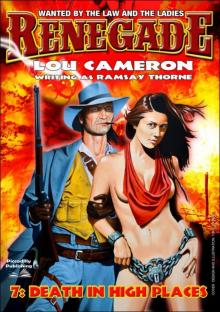 Death in High Places (A Renegade Western Book 7)
Death in High Places (A Renegade Western Book 7)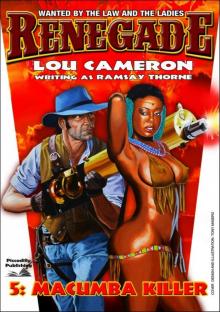 Macumba Killer
Macumba Killer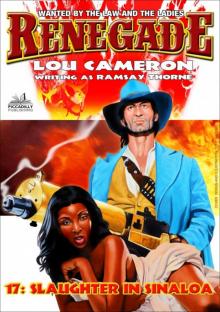 Renegade 17
Renegade 17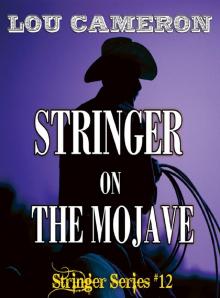 Stringer on the Mojave
Stringer on the Mojave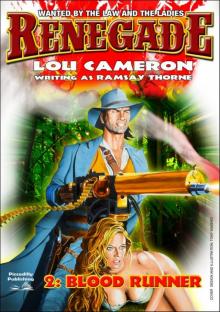 Blood Runner
Blood Runner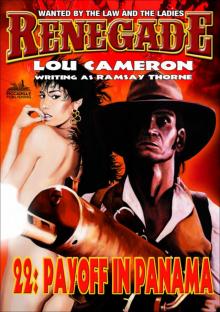 Renegade 22
Renegade 22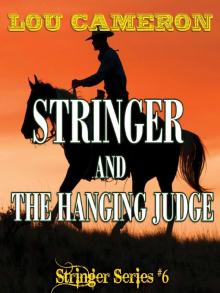 Stringer and the Hanging Judge
Stringer and the Hanging Judge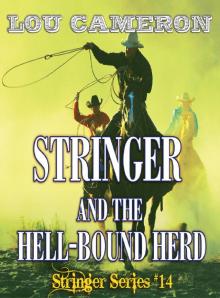 Stringer and the Hell-Bound Herd
Stringer and the Hell-Bound Herd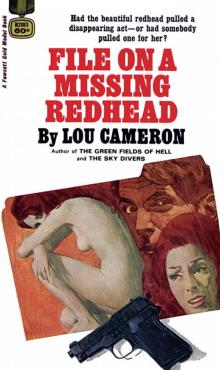 File on a Missing Redhead
File on a Missing Redhead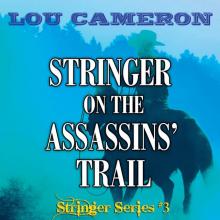 Stringer on the Assassins' Trail
Stringer on the Assassins' Trail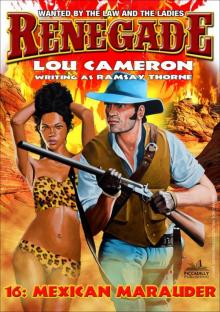 Mexican Marauder (A Captain Gringo Adventure #16)
Mexican Marauder (A Captain Gringo Adventure #16)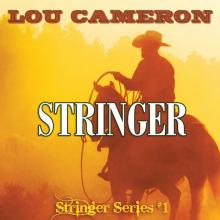 Stringer
Stringer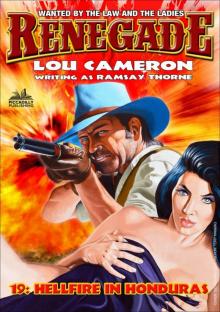 Renegade 19
Renegade 19 Stringer and the Oil Well Indians
Stringer and the Oil Well Indians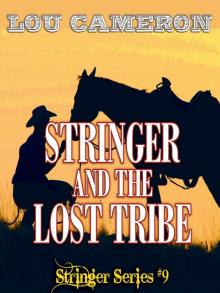 Stringer and the Lost Tribe
Stringer and the Lost Tribe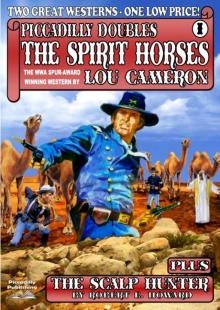 Piccadilly Doubles 1
Piccadilly Doubles 1 Stringer and the Border War
Stringer and the Border War Renegade
Renegade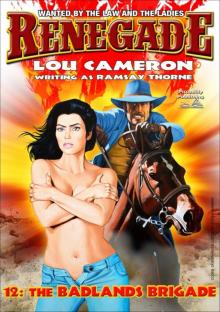 The Badlands Brigade (A Captain Gringo Adventure Book 12)
The Badlands Brigade (A Captain Gringo Adventure Book 12)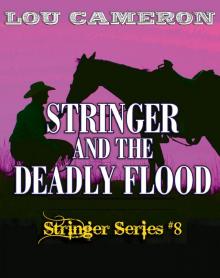 Stringer and the Deadly Flood
Stringer and the Deadly Flood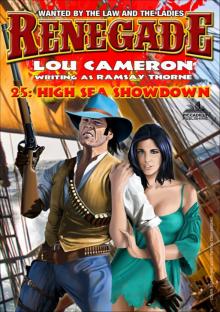 Renegade 25
Renegade 25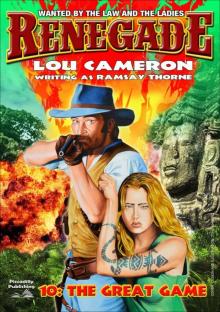 The Great Game (A Captain Gringo Western Book 10)
The Great Game (A Captain Gringo Western Book 10)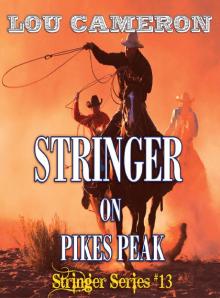 Stringer on Pikes Peak
Stringer on Pikes Peak